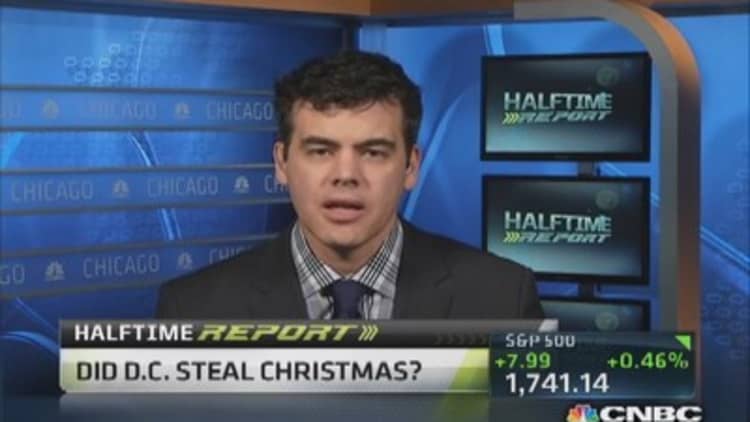It's bad news for retailers and consumers: Those big tax refunds they're counting on to boost sales and pad bank accounts are going to take a little longer.
Due to the government shutdown, the IRS will delay the start of the tax filing season by one to two weeks. The original start date of Jan. 21 has now been postponed to no earlier than Jan. 28 and no later than Feb. 4.
If 2014 is anything like 2013, when consumers also got refunds later than usual, the delay could whack retail sales after what is forecast to be a tepid holiday season, with the consensus running at about 3 percent to 4 percent growth.
"You always hear [sales] just get pushed out, but it doesn't happen," said Brian Sozzi, CEO and chief equities strategist at Belus Capital Advisors. "The lower- or middle-income family just realizes they don't need to purchase that extra shirt from Macy's and instead decides to save it if something goes wrong. ... The consumer emotionally and physically closes up."
Delayed tax refunds, combined with rising gas prices and the expiration of the payroll tax cut, caused soft sales for several retailers earlier this year, notably Wal-Mart. According to IRS data, processed tax returns as of March 1 had fallen 13.1 percent, while those filed by March 29 were down 4.5 percent, highlighting the sharp drop in earlier returns.
A tough start to 2013
On Wal-Mart's first-quarter earnings call, CEO and President Mike Duke attributed pressured sales to delayed refunds, which caused customers to put off discretionary purchases. The company's U.S. same-store sales fell 1.4 percent in the period, missing projections for flat growth. That followed a 2.6 percent same-store sales gain in the year-earlier quarter.
At the time, Bill Simon, head of Wal-Mart's U.S. stores, said that it had expected "to recover a reasonable portion of these tax refunds and had also assumed that customers would follow historical spending patterns with these funds. This did not materialize as we had anticipated."
Several other retailers also noted softness related to consumers' receiving their yearly IRS windfalls later than usual.
Foot Locker executives described the end of January and the beginning of February as "tough."
(Read more: Shoppers slash holiday spending plans amid crisis)
William Nictakis, Hanesbrands' chief commercial officer for international businesses and global retailers, said the delay had affected business.
"When we look at our point-of-sale trends, we estimate the delayed tax refunds dampened sales by about $20 million," he said.
Family Dollar CEO and Executive Chairman Howard Levine echoed consumer price sensitivity on its second-quarter earnings call transcript, provided by Morningstar, saying that the delay "had a particularly large impact on the business in late January and early February."
Sales trends improved only once tax refunds returned, though they were still weaker than before, he said. Family Dollar same-store sales rose 2.9 percent in both the second and third quarters— less than half the growth in the quarter before the delay and expiration of the payroll tax cut.
(Read more: What DC wrangling means for your holiday budget)
The lost opportunity
Retailers may view the delay as déjà vu all over again.
Matthew Boss, an equity research analyst at JPMorgan, said that because of the delayed tax refund, retailers will lose an opportunity to get a boost in fiscal first-quarter sales. Instead, the later windfalls will shift to the second quarter primarily.
"You had the opportunity to see the shift had this not happened," he said. "You would have seen the first quarter look better, but it won't now."

Another school of thought maintains that the delay could just delay rather than eliminate spending.
"You might get more spending in late February than early February," said Paul Dales, senior U.S. economist at Capital Economics. "What we're talking about here is a shift in the timing of spending rather than the amount."
(Watch more: Coach CEO: Broadly, luxury brands doing well in US)
At the margins though, it will affect some people who won't have as much money to spend, he added.
One holiday that could get hit is President's Day weekend, when many retailers hold promotions. That's key in an environment in which companies have trained shoppers to seek discounts.
"If there are discounts available on just that day and you miss it, you might not buy anything," Dales said. "So that might be an example where some spending doesn't necessarily take place."
Belus Capital's Sozzi said the impact could begin as soon as Black Friday, when people might spend less knowing that they won't get tax refund checks as early as expected.
"Retailers might have to discount in December just to get people engaged in the stores so they don't enter January with too much inventory," he said.
Boss at JPMorgan also said this mind-set could slightly affect holiday sales.
"Is it lost forever?" he said. "I don't think it's lost forever, but I think it definitely hurts the post-holiday spending."
People are spending more cautiously overall, Boss said.
"If it's not the key week of Christmas or back to school, the consumer basically shuts off," he said. "My fear after you we got through Christmas is there is no catalyst to spend anymore."
—By CNBC's Katie Little. Follow her on Twitter @KatieLittle


